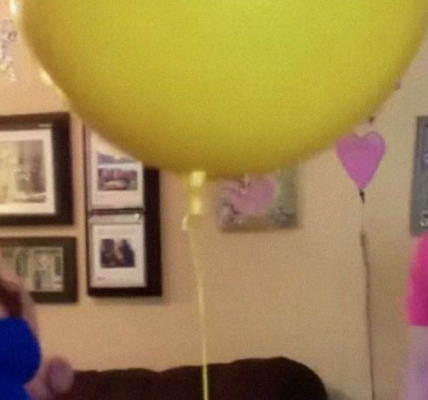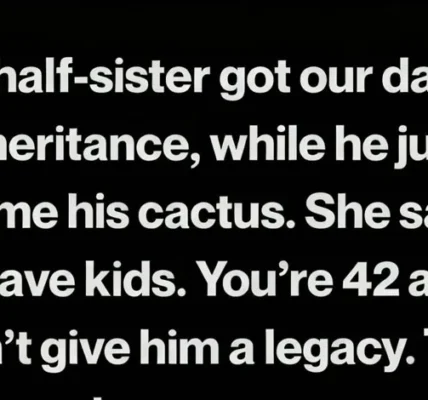Six months ago, I was decorating a nursery and trying to decide between cloth or disposable diapers. I didn’t know my whole life was about to flip upside down—twice.
It started with a dull ache in my thigh. I thought it was pregnancy-related, maybe a pinched nerve or sciatica. But it got worse. After my daughter, Liora, was born, I pushed through it because I wanted to enjoy every little moment with her. That newborn smell, those tiny fingers—I was obsessed. But the pain kept getting sharper. One morning, I couldn’t even stand to rock her.
I finally went in for scans. The doctor came in with that face. The one that says, “this isn’t going to be easy.” It was a rare form of soft tissue cancer—aggressive and spreading fast. I remember gripping the edge of the hospital bed and thinking, I just had a baby. I don’t have time for cancer.
Chemo started immediately. My milk dried up. I had to hand Liora to my mum most nights because I couldn’t stop vomiting. Then the tumor grew into my femur. They said amputation would give me a better shot. I signed the papers without crying—I didn’t want anyone to feel sorry for me.
I woke up after surgery with one leg and a mountain of guilt. I couldn’t carry my daughter. Couldn’t chase her when she learned to crawl. Couldn’t wear the dress I bought for her naming ceremony.
But I’m still here.
That was three weeks ago. I’ve started physio. Liora is teething. And this morning, I found something in my medical file I wasn’t supposed to see. Something about a scan they never told me about. And now I don’t know if they’re hiding the truth… or if I’m about to face another fight.
I paced my small living room, balancing on my crutches, that ominous scan document clenched in my hand. My heart felt like it was pulsating in my throat. I wanted to call my doctor right away, but I hesitated—what if it was a mistake? The lines on the report were full of medical jargon, but one phrase stood out: suspicious lesion in the right lung. I didn’t remember anyone discussing my lungs. All my focus had been on my leg.
Finally, I dialed my oncologist’s office. They were closed for the day. My next appointment was scheduled for the following week, but I just couldn’t wait that long. My gut churned with the possibility: had the cancer spread?
The next few days were a blur of sleepless nights and attempts at normalcy. Liora’s bright eyes and drooly grin were the only things keeping me grounded. I clutched her close when I fed her, brushed my nose against her soft cheek to steady my racing thoughts. Mum stepped in for late-night feedings when I collapsed from exhaustion, both physical and emotional. I knew she was worried, too. She kept asking if I was okay, and I kept pretending I was. I didn’t want to add one more layer of stress to our already chaotic lives.
When my appointment day finally came, I felt like I was walking into a courtroom. Every hallway in the hospital echoed with memories of chemo, amputation, and that sinking dread I’d lived with for months. I could practically smell the antiseptic that had surrounded me for so long. This time, though, I rolled my wheelchair toward my oncologist’s office, because my stump was too sore from a recent round of physical therapy to manage crutches over such a distance.
Dr. Armitage, my oncologist, greeted me with the same serious but kind expression. I didn’t even wait for small talk. “I found a note about a suspicious lesion in my right lung. Is it cancer? Why didn’t anyone tell me?”
He sighed, looking genuinely apologetic. “I wanted to confirm the findings before alarming you. There’s a small spot on your lung, but we’re still determining whether it’s malignant.”
The word “malignant” hit me like an avalanche, but I forced myself to stay calm. At least I had the truth now. Another scan was scheduled for the following week, followed by a biopsy if necessary.
The next few days felt surreal. I tried to keep up with Liora’s routine, but every time she giggled or reached out her arms, I’d catch myself wondering if I’d be healthy enough to watch her grow up. My mind spiraled into dark places. To cope, I threw myself into physical therapy, determined to get the hang of my new prosthetic leg.
At the rehab center, I met a woman named Saoirse. She had lost her leg in a car accident years ago. She was calm and collected, the polar opposite of my inner chaos. She showed me little tricks on how to balance better, how to pivot without tipping over, and how to get past the phantom pains that haunted me at night. She also shared her story—she wasn’t just a trauma survivor; she was a single mother who’d raised her son after losing her husband to a stroke. Somehow, listening to her story gave me strength. She’d navigated more heartbreak than most people could imagine, yet here she was, encouraging me to fight for my future.
“Keep your heart open,” she told me one afternoon, while we practiced walking in a mirrored room. “People will surprise you with their kindness. And so will you, once you realize how strong you really are.”
I took that advice to heart.
A week later, the day of my new scan arrived. My mum drove me to the hospital, and we both stayed quiet during the ride. We’d already run through every possible scenario a dozen times. This was it—the final piece of the puzzle that would determine whether I’d need more treatment or if I could focus on healing my body as it was.
Liora was with my aunt, who had come to stay for a few days to help out. In the waiting room, I felt like all the walls were closing in. The smell of antiseptic stung my nose, and the machines around me seemed louder than usual. I turned to my mum and said, “I’m not ready for another round of chemo. I don’t know if my body can handle it.”
She squeezed my hand and whispered, “Whatever happens, we’ll get through it together.”
Finally, I was called in. The scan was over in a flash, but the wait for the results felt like an eternity. Dr. Armitage stepped in, holding a folder. His expression was unreadable. I tried to prepare myself for the worst.
“Good news,” he said, and I think my breath caught in my chest. “The lesion appears to be stable, and from what we can tell, it’s benign. We’ll keep monitoring it, but for now, it doesn’t look like cancer has spread.”
I didn’t know whether to cry or laugh. I went with a mix of both—tears streaming down my face, a shaky grin splitting my cheeks. Mum wrapped me in a hug so tight it felt like she was never going to let go. My entire body was trembling, but relief spread through me like a warm blanket on a cold night.
In the weeks that followed, I poured my energy into getting stronger, both for myself and for Liora. My new prosthetic leg was challenging, but each step felt like reclaiming a piece of my life. I woke up early for gentle stretching, which helped with phantom pain. I found that massaging the stump before bed reduced nighttime discomfort, and as I got better at maneuvering, I finally felt confident enough to hold Liora in my arms while standing—something I hadn’t done since before the surgery.
The more I practiced, the more I realized I wasn’t just recovering physically. My spirit felt lighter. That dark cloud of constant anxiety started to lift. Yes, there was still the possibility I’d need further scans and checkups. But that was part of my new reality—living with the knowledge that cancer could always lurk in the background, yet choosing to move forward anyway.
One morning, as I was carefully stepping around the living room with Liora in my arms, she let out the sweetest laugh. She reached up and patted my cheek with her tiny hand, and I realized she didn’t care about my scars or my prosthetic or the fact that I got tired more quickly than before. She just wanted me.
We had a small gathering to celebrate this new chapter—a mini “victory” party, if you will. My mum baked a vanilla cake with bright pink frosting. A few close friends from my childhood came by with flowers and balloons, and even my physical therapist and Saoirse made an appearance. We raised our glasses (of lemonade, mostly) in a quiet toast: to survival, to resilience, and to the simple blessings we often take for granted.
That evening, as I tucked Liora into her crib, I stared at her peaceful face and thought about how far we’d come in just half a year. The nursery walls, once decorated with pictures of pastel elephants and rainbows, now seemed to embody the entire journey. Life had turned me upside down more than once, but I was still here—still standing, literally and figuratively, with my daughter in my arms.
Sometimes, we don’t get to choose the battles we fight. We don’t get to hit pause when things spiral out of control. But we do get to decide how we’ll respond. There were days when I wanted to hide under the covers and cry until I couldn’t breathe. Yet every time I looked at Liora’s face, I found a reason to push on.
If there’s one lesson I hope everyone takes away from this story, it’s that life can turn on a dime. No one is guaranteed an easy road. But even when you lose a piece of yourself—be it a limb, your health, or your peace of mind—you can still find a path forward. Sometimes it’s through the support of family, or a stranger who becomes a friend, or even the unwavering love in your child’s eyes.
Never underestimate the power of determination, and never let your circumstances define you. We’re all more resilient than we realize. Whether you’re facing a health scare, a loss, or any major struggle, know that you have the strength to keep going. You might surprise yourself with what you can overcome.
Thank you for reading my story. If it touched your heart, please share it with someone who could use a bit of hope. And if it made you believe in your own strength a little more, give it a like and spread the word. Life can be unpredictable, but together, we can remind each other there’s always reason to hope—and that love is stronger than any obstacle we face.


